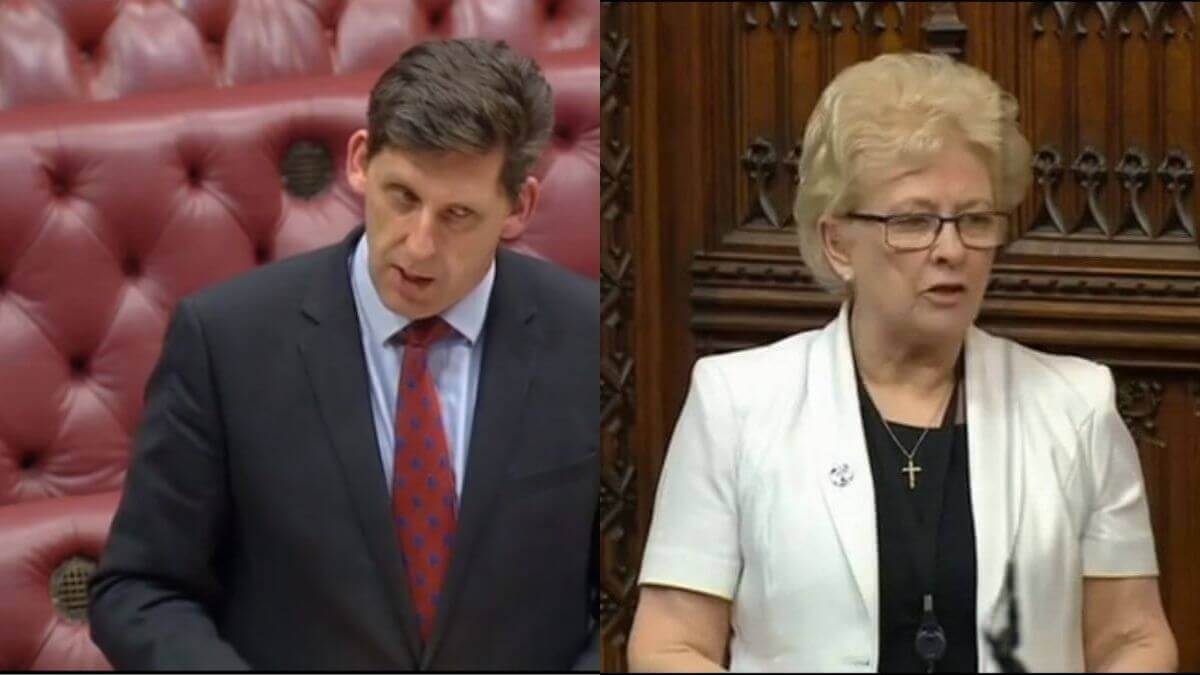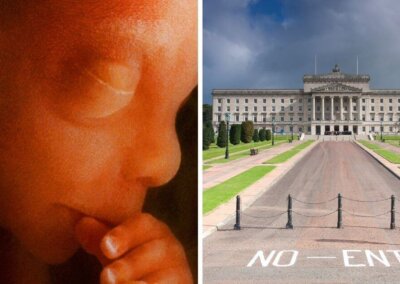UPDATE: As of 19/07, over 19,000 residents of Northern Ireland have backed Baroness O’Loan’s letter
Baroness O’Loan has accused a Westminster attempt to force changes in the abortion law in Northern Ireland of “treat[ing] the people of Northern Ireland with contempt” in an open letter to the Prime Minister.
As of Monday over 15,000 people from Northern Ireland have backed Baroness O’Loan’s letter and objected to this anti-democratic move by Westminster. The letter demands that the Government take one of two options: either withdraw the Bill or add a clause to the Bill to address the democratic deficit within the Bill.
In a follow-up to her speech in the House of Lords, the letter to Theresa May, which is open for anyone from Northern Ireland to sign, draws attention to the constitutional impropriety of the fast-tracking of this controversial Bill.
This is the first time the Conservative Government have actively promoted abortion legislation and scrapped it’s neutral position on abortion.
In fact, due to the rushed process, according to Baroness O’Loan and apparently confirmed by the Government, that the abortion amendment does not function properly and cannot, for various technical, legal reasons, implement abortion into Northern Ireland.
“The clause which is currently in the bill does not work,” the baroness told the BBC’s Good Morning Ulster programme.
However, the Government has since made clear that it is working to redraft the abortion clause so that it can force abortion onto Northern Ireland.
Lord Duncan said: “I have just met [the MPs who proposed the amendments] to discuss how best to take this forward and to ensure that [the amendments] can be delivered.”
Baroness O’Loan said that the Government are trying to force this Bill through, despite the fact that “100% of MPs representing Northern Ireland voted against the abortion amendment. It was imposed by more than 300 MPs who neither consulted nor represent the Northern Irish people.”
The radical abortion amendment was only made known on Thursday (04/07), it was only selected 37 minutes before the debate began on Tuesday (09/07), and was subsequently voted on later in the afternoon. MPs were advised before the debate that the abortion amendments were not in scope, so it came as a surprise to many when the Speaker selected them for debate.
Furthermore, the Bill failed to follow ordinary Parliamentary procedure. O’Loan said:
“Such significant proposals for change in the UK are normally preceded by at least a three month consultation. The views of the democratically elected representatives of the people of that part of the UK would be respected. There would be a full and proper legislative procedure which would permit proper debate about any such significant change and any such bill would follow the normal parliamentary procedures. It would be dealt with according to convention, and having regard to all our international legal obligations.”
The purpose of the Bill was to extend the period for the formation of an Executive in Northern Ireland whose Assembly is currently not sitting. Baroness O’Loan, along with a number of other critics, have said that this abortion amendment substantively alters the content of the Bill which had nothing to do with abortion.
In accusing the attempt to force abortion on the region, she reminds the Prime Minister of the threat that this legislation poses to the political balance between Westminster and Stormont, saying that the move will actually harm attempts to form an Executive in Northern Ireland.
The Bill with its radical abortion amendments undermines devolved powers of Northern Ireland who have legal control over their own abortion laws. The DUP’s Westminster leader, Nigel Dodds MP, even said the amendments would “drive a coach and horses through the principle of devolution”.
Clare McCarthy from Right To Life UK said:
“It is disgraceful that the Government would not just allow this hijacked Bill to pass under their watch, but now they intend to introduce secondary legislation to directly introduce abortion on demand to Northern Ireland without any involvement from the people of Northern Ireland.
“This is a shocking departure from the Government’s neutral position on abortion and a departure from their firmly-held position of respecting devolution.
***
Full text of Baroness O’Loan’s letter
Dear Prime Minister,
We are writing to you about the NI (Executive Functions) Bill, currently before Parliament.
Last week an amendment which seeks to change substantively the law on abortion was tabled to this Northern Ireland Bill by Members of Parliament who do not represent constituencies in Northern Ireland. This Bill had been subject to a fast-track procedure, the constitutional propriety of which has been questioned, and the use of which has most recently been discouraged in the context of Northern Ireland, except in urgent situations, by the Constitution Committee of the House of Lords. The use of the fast-track procedure reduced even further, the opportunity for proper scrutiny.
The amendment was then selected even though the clerks advised the Speaker that it was out of scope. Despite the fact that this devolved matter was addressed very recently by the Northern Ireland Assembly in 2016 when a clear majority of MLAs voted against changing the law in any way, this amendment was passed. This Bill has, therefore, been extended in a manifestly inappropriate way because basic constitutional procedures regarding selection of amendments were disregarded. 100% of the Northern Ireland MPs who have taken their seats at Westminster, voted against what has become Clause 9 of the bill. The imposition of this legislation on Northern Ireland in its current form, voted for only by MPs who do not represent constituencies in Northern Ireland, would represent a massive democratic deficit.
As Lord Duncan said in October last year when the previous Act was passed, “As someone who comes from part of the kingdom which has a fully functioning devolved Government, I stress again that these decisions must be taken by the devolved Administration in the north of Ireland. There is no point in pretending we can usurp democracy in that fashion, simply because devolution is not to our liking. Devolution must function even when it is not as we would like to see it, but rather, how it must be”.—[Official Report, 30/10/18; col. 1278.]
Regardless, then, of what one thinks about abortion it is a very big issue and the manner in which there has been an attempt to change abortion law in Northern Ireland this week treats the people of Northern Ireland with contempt, since there is this huge democratic deficit in a situation in which sensitive negotiations are ongoing. It has the capacity to undermine the delicate political calibration between Northern Ireland and Westminster and to cause significant damage to attempts to restore the Northern Ireland Assembly. We want to see the Northern Ireland Assembly restored and functioning.
Such significant proposals for change in the UK are normally preceded by at least a three month consultation. The views of the democratically elected representatives of the people of that part of the UK would be respected. There would be a full and proper legislative procedure which would permit proper debate about any such significant change and any such bill would follow the normal parliamentary procedures. It would be dealt with according to convention, and having regard to all our international legal obligations.
This has not happened in the current bill, and Lord Duncan has been unable to certify that it is fully compliant with European Human Rights Convention obligations.
That was not the Government’s fault BUT the Government now has a responsibility to respond.
We note that Lord Duncan has said that he intends to re-write the deficiencies in clause 9, which is not legally capable of being implemented, but if this involved placing the power to act on any basis other than the Section 26 power agreed by Parliament, this would involve the Government breaking the Sewell Convention, part of which involved an assurance to the devolved administrations that Government would not legislate on transferred matters, such as abortion, without the consent of the devolved administration. It would also make the Government complicit in the constitutional abuses which occurred last week in the House of Commons.
We are writing to call on you to do one of two things:
Either withdraw the Bill, which as the NI Attorney General has said is in part “unclear and inconsistent with important human rights texts,” and which is inherently contradictory. We accept that this would require the introduction of another Bill to achieve the legitimate purpose of the original NI (Executive Functions) Bill. It would then be necessary for the Bill to be handled in a way which is not inconsistent with the law, the constitution and the UK’s international obligations.
Alternatively Government could support the amendment introduced by Baroness O’Loan, Lord Eames and Lord Hay, which seeks to address the total democratic deficit of the current bill by requiring that any legislation emanating from Clause 9 must be subject to a public consultation and only laid before Parliament if it has the support of a majority of members of the Northern Ireland Assembly.
We the under-signed cannot overstate the grave importance of this matter.












